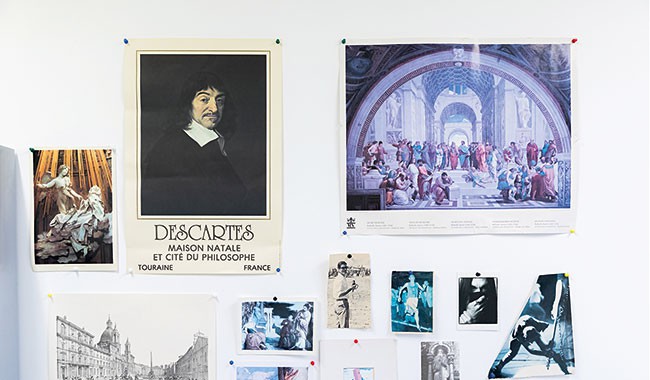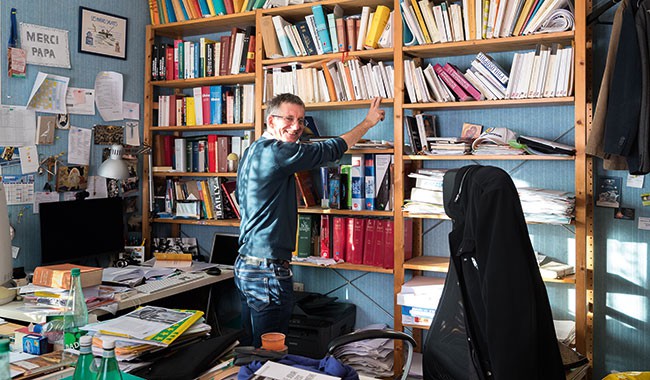I received the grace of having fallen into Catholicism when I was little. My parents raised me in this way from an early age because they thought it was good for me. They passed on to me a quiet Christianity that I received as a sort of evidence.
But at 18, when I went to Paris to study philosophy, the ingenuous provincial that I was, experienced a small crisis of faith. Nothing dramatic, but the awareness of a decoupling, even of a chasm, between my naive faith, which remained that of a 12-year-old child, and what I was beginning to think as a young man.
It must be said that the catechism of my childhood had been light from a doctrinal point of view and that the intellectual atmosphere of the end of the 1980s was not the most favorable to Christianity. For my teachers, the statement “God is dead” went without saying and you had to be the last of the imbeciles to be a Catholic!
“Being a Christian and intelligent are not incompatible”
My resolve to stop praying, however, did not last long. Quite quickly indeed, I felt such a lack that I said to myself: why deprive yourself and hurt yourself deliberately? At that time, I met many left-wing Catholics, people who were very committed to charity: they embodied in an admirable way chapter 25 of the Gospel according to Saint Matthew.
Their testimony nourished my wavering faith, as well as that of some great intellectuals who had the courage, in a hostile context, to appear Catholic: Jean-Luc Marion or Jean-Louis Chrétien, Jean Delumeau or René Rémond convinced that being a Christian and being intelligent were not incompatible. What a relief (laughs). Then, while continuing my studies at the École Normale Supérieure, I discovered that certain philosophical statements enriched my faith, and vice versa.
Fan of Descartes and his discourse on God
I owe a lot to Saint Augustine and Saint Thomas Aquinas, but also to Descartes. Regardless of this tradition of anti-Cartesianism at work in the Church, I found its arguments in favor of the existence of God and the immortality of the soul good. I liked his serene way of approaching and unraveling the question of the relationship between faith and reason.
With Descartes and his disciples, notably Malebranche and Spinoza, I became convinced that it was possible to hold a discourse on God with the help of reason. Possible, and even desirable since the specificity of Christianity lies in this marriage between, on the one hand, a Semitic source, Revelation as it is recorded in the Bible, and, on the other hand, Greek rationality.
In the prologue to his Gospel, Saint John thus describes Jesus as the Logos, that is to say, “the reason”. These marriages between Christianity and philosophy have been criticized throughout history. When Celsus or Nietzsche considered that the Jewish source had corrupted the beautiful Greek rationality, others reproached philosophical rationality for having rotted Christianity: faith alone is enough.
Reason is the faculty of the universal
I am worried about the current resurgence of this fideist current. Attention ! Being on my mother’s side the descendant of peasants from Berry who were also profound believers, I have great respect for the “faith of the coalman”.
But let’s be honest: today, the vast majority of Catholics are urbanites who have studied and have the means to think. However, many of them reject any rationality in religious matters. They are content with a faith that is reduced to a feeling and falls back on “interiority” alone.
This anti-intellectualism bothers me because it translates into an identity tendency towards communitarianism. Reason is the faculty of the universal, the one that allows dialogue, sharing and exchange: not making use of it is therefore tantamount to withdrawing into oneself. And this attitude is diametrically opposed to the universal, that is to say Catholic, aim of the Christian message.
For my part, I have never had the temptation to take refuge in a discourse of sensation. Probably because it has never been given to me to feel the presence of God. I don’t make a drama out of it. And in a way, it is even a chance, because I am obliged to take seriously the injunction of Saint Peter: “You must always be ready to explain yourself to all those who ask you to explain the hope that is in you” (1 Peter 3, 15).

Teaching students who have a desire to learn…
This work of explanation is all the more necessary since the public university where I have the joy of teaching philosophy is a beautiful “periphery”, according to the expression of Pope Francis. In fact, while being very nice to me, my colleagues look at me as a somewhat odd guy who believes strange things.
As for my students, most of them no longer know anything about Christianity, but I am struck by their desire to learn, for example in the biblical culture option that I offer them. Rubbing shoulders with intelligent people who don’t think like me is a valuable off-centering experience. I am constantly questioned and, in doing so, it is impossible for me to be completely comfortable with my own evidence, to settle down, cushy, in my faith.
“Defend the faith that is threatened in Europe”
In May 2007, I was invited to a congress of Christian intellectuals organized at the Vatican. Invitation which I found very unexpected insofar as I was only an ordinary university teacher! I had certainly written a certain number of books and articles, but as a specialist in the philosophy of the XVIIe century (so scholarly works, full of notes in Greek and Latin, on the theory of substance in Descartes or that sort of thing).
Despite everything, I accepted the invitation and, once there, I had the feeling of not being… in my place. Until Pope Benedict XVI receives us in private audience. His speech struck me: “I brought you here because we need you to defend the faith which is threatened in Europe. I count on you. »
On the plane back, I said to myself that I was no longer going to limit myself to scholarly academic work, and to launch myself into apologetics. I am not a providentialist, but the pope was clearly a trigger in the reorientation of my career; my wife, she talks about “midlife crisis” (laughs).
Focus on the Christian rationalist philosophers
Since then, I have modestly subscribed to the fine tradition of Christian rationalist philosophers. These great authors, from Saint Augustine to Benedict XVI, from Saint Anselm of Canterbury to Paul Ricœur, who knew how to develop a kind of spirituality of intelligence. My ambition is not to innovate, but to make people love old things.
To make Catholic doctrine comprehensible to my contemporaries which, although not entirely rational, is in my eyes reasonable through and through. In the ways of salvation for example, in my first book on apologetics, I tried to re-explain the notion of “redemption”, which had become incomprehensible, in more accessible terms of “salvation”.
Catholics cannot always be in permanent opposition or criticism, except to agree with Nietzsche for whom Christianity is only a reactive doctrine. They cannot just be “against”. We must positively propose, be a power of incarnation, and show how the Christian faith can have beneficial effects on human existence.
A solid anchor in the storms
To be honest, I don’t think being a Christian fundamentally changes my day-to-day life. I just try to act like an “honest man”, and I know atheists who are more charitable or upright than me. I am therefore not comfortable with the idea that “if God does not exist, morality collapses” or with Pascal’s theme of “misery of man without God”.
On the other hand, when a real tile falls on you (and who can escape it?), it is welcome to have a somewhat efficient metaphysical device. Christianity is one of the great historically proven spiritual traditions that can play that role. Its heart being the story of the three holy days, from the absolute despair of the Passion to the recovery of Easter, it provides inner resources to try to weather, somehow, the storms of existence.
This is the subject of my latest book, Resurrections, going through the nights of our lives. In this work as in the others, my goal is not to impose my faith nor to convert anyone (no conversion is obtained by arguments), but simply to tell people: know that this exists, and how interesting!
The stages of his life
1967 Born in Bordeaux (33).
1987 Studied at the Ecole Normale Supérieure.
1990 Is received at the aggregation of philosophy.
1992 Marries Anne-Sophie, with whom he will have four children.
1996 Thesis on Malebranche. start teaching
philosophy at the University of Nantes (44).
2010 Publish the Ways of Salvation. A philosophical essay (Bayard).
2014 For life ? Short treatise on marriage and separations (Threshold).
2017 Death, where is your victory? (Bayard Editions).
2018 How can one be Catholic, Threshold.
Our Lenten series
Three years ago, during Lent 2019, the Essentials offered you the opportunity to discover the seven corporal works of mercy, these concrete actions “by which we come to the aid of our neighbor in his bodily needs” (Catechism of the Catholic Church). This year, place for “spiritual necessities” to which we must also respond in order to be vectors of God’s mercy.
1. Advise those in doubt.
2. Teach the ignorant.
3. Warn sinners.
4. Comfort the afflicted.
5. Forgive trespasses.
6. Patiently put up with annoying people.
7. Praying to God for the living and for the dead.
Denis Moreau: “We must develop a spirituality of intelligence”

